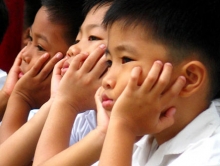Corporate inroads on public education in the Philippines

So called low-fee for profit schools, funded by conglomerate Pearson, are increasing their market presence by taking advantage of the poorest within the country’s secondary education sector.
"Rather than investing in quality free primary and secondary education for all, the Philippines government is encouraging the growth of for-profit Affordable Private Education Centres (APEC) private schools. Fees charged by APEC represent about 40% of the income of the poor in the Philippines. That’s hardly affordable," said EI's Angelo Gavrielato.
With the new United Nations Sustainable Development Goal on education making it clear that “all girls and boys complete free, equitable and quality primary and secondary education” by 2030, there is international consensus that for-profit education is not the way.
Since 2009 the government’s allocation of funds to private school chains has increased to more than PHP 31 Billion, nearly $700 million USD, which could have paid for 60 thousand more classrooms and accommodated roughly 3 million students.
The report. written for EI by Curtis B. Riep, reveals how for-profit schools are using the education system, with the aid of public money, to produce a generation of young people programmed to work as “semi-skilled... cheap labour” for a plethora of corporations in the Philippines. At the same time, low-fee for profit schools are employing untrained teachers for low wages at the cost of quality education.
Source: Education International

